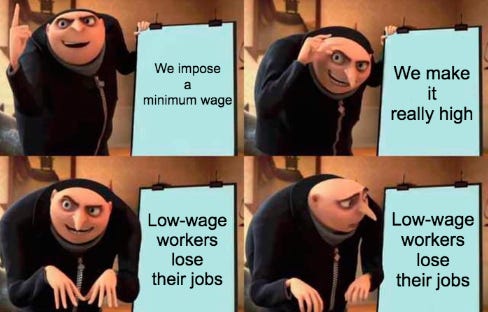#124 – Economic Creationism Fails to Explain Reality
You cannot coerce your way to a better world.
Before Darwin, people assumed a supernatural being created all biological adaptations. It was radical to think complex structures like the eye could develop without a designer.
Creationism is flawed because it fails to answer, among other things, “Who created the designer?”
Darwin’s theory explained adaptations in living organisms better than all rival theories. So, biologists today can’t help but take Darwin’s theory of evolution by natural selection seriously to understand life.
In economics, “central planning” is the counterpart to creationism. Central planning claims a top-down planner is necessary for prosperity and order in society.
I call this “economic creationism” to distinguish it from biological creationism.
Both ideas, though still popular, are false. But economic creationism threatens our prosperity far more.
Economic creationists believe a central planner can fix all problems with the right laws and solutions.
Workers getting low wages? Just make businesses pay a high minimum wage. Problem solved.
They forget that prices exist for a reason.
Prices signal what people want in a world of scarcity, much like language conveys thoughts. Both prices and language emerge bottom-up and enable large-scale coordination.
No central planner created a successful language; it emerged organically from the ground up.
In a free market, prices (tend to) balance supply and demand. If prices shift from this balance, the market corrects itself, returning prices to balance supply and demand.
When the government sets prices, it disrupts this equilibrium. Price controls merely hide costs instead of reducing them.
As Thomas Sowell said, “Reality doesn’t change when the government changes price tags.”
The world is too complex for one central planner to manage. Yet, economic creationists believe only in authoritarian solutions.
A plane crashed? The government should regulate the industry.
A plane crashed even with regulations in place? See, that’s why we need more government intervention.
Ironically, both biological and economic creationism undervalue creation.
If a supernatural creator made the universe, the true creator of Darwin’s (or any other great scientist’s) theory would be the supernatural being, not the scientist. Creationism denies the actual creation of the scientist’s discoveries.
And it truly is creation. Before a discovery, no prediction can reveal its content or consequences. If it could, it would be the discovery itself.
As David Deutsch explains in The Beginning of Infinity, scientific discovery is unpredictable, even though it’s determined by physics.
Hence, creationism is wrongly named. It doesn’t explain knowledge as creation but denies actual creation by placing knowledge origin in an unexplained realm.
Creationism is actually creation denial.
Economic creationists see wealth as a fixed pie. They think we already have enough resources, but some people have more than their “fair share” and must redistribute their wealth to those “in need.”
They believe redistributing wealth by force will make everyone happy.
Economic creationism ignores the true wealth creation that occurs when ideas produce goods people buy for more than their production cost.
Even many free-market “proponents” fail to apply our best understanding of economics universally. They want the government limited to making laws, enforcing them, and resolving disputes. But that begs the question: why those fields and not others?
If the government is incompetent at producing goods like cars and phones, why trust it with arguably more serious matters such as making, enforcing, and arbitrating laws?
Just like evolution doesn’t leave the creation of some species to a god, economic principles apply to all scarce resources. We can’t selectively apply these principles.
My friend Logan Chipkin, who introduced me to “economic creationism,” sums up the radical implications of economics in nine words:
“You cannot coerce your way to a better world.”
Economic creationists deny this and advocate force as the only solution.
Further Reading
Economic Creationism by Logan Chipkin
Economics: A Universal Acid by Logan Chipkin
Chapter 4: Creation of The Beginning of Infinity by David Deutsch
Follow me on X: @arjunkhemani
Click here to support my work.


Good article, as usual. I would like to better understand your perspective.
Assume there were a society free of government. At a point members of the society began to realize that some practices were causing net harm to the society as a whole. Practices such as marketing extremely addictive and harmful substances to kids, toxic pollution poisoning land, water and air, or etc. The society comes together and creates a system of institutions and government with elected officials. There would be periodic elections and multiple branches with checks an balances, the members simply wanted a way to curb the bad practices without violence. Assume an ideal version democratic republic process.
Would that be a decentralized bottom's up solution to a problem? The creation of government in interest of the preventing practices that are harmful to society without resort to violence. Obviously the newly created government was not central planning or top down.
If you agree it is a bottom-up creation of a solution. How many generations pass before now the institutions and government are considered central planning or top down? Obviously the institutions will need to change and adapt as societal norms, technological development and etc change with time. Is it just one? Because the first generation born into the society with the government were not around in the conception and creation?